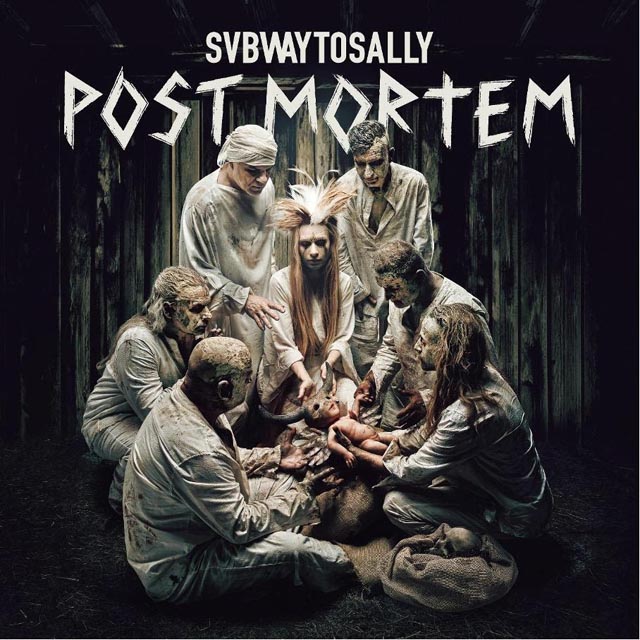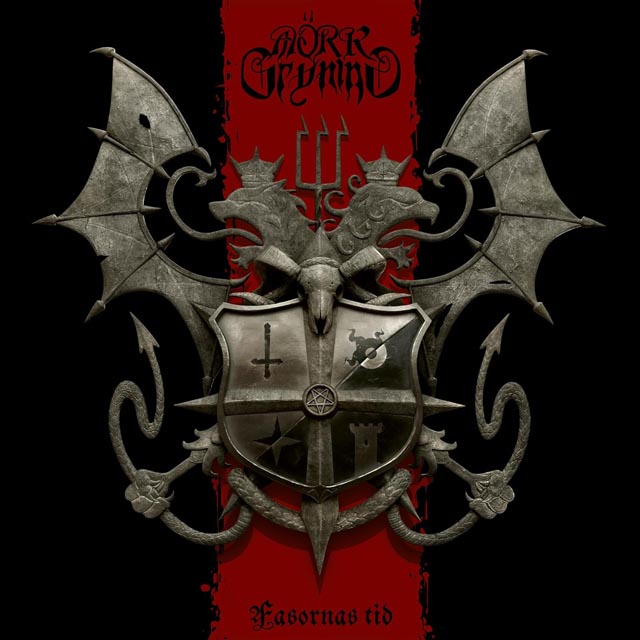 It’s taken 12 albums for Dream Theater to release a self-titled album, but their forthcoming album lives up to all the connotations that come with naming an album after your band. It’s truly a new beginning, as it’s their first album with new drummer Mike Mangini fully involved with the creative process. The band themselves were on hand yesterday at New York’s Germano Studios, where they mixed the album, to host an album playback. Keeping with the new beginning, this was the first time the band have hosted a listening part fpr of one of their albums. The self-titled album is dynamic, heavy and catchy, and while it will certainly appeal to longtime fans of the band, definitely has the potential to reach new ones as well. Following the playback, we caught up with Mangini to talk about his involvement with the new album, playing live vs. in the studio, and Dream Theater’s rabid fanbase.
It’s taken 12 albums for Dream Theater to release a self-titled album, but their forthcoming album lives up to all the connotations that come with naming an album after your band. It’s truly a new beginning, as it’s their first album with new drummer Mike Mangini fully involved with the creative process. The band themselves were on hand yesterday at New York’s Germano Studios, where they mixed the album, to host an album playback. Keeping with the new beginning, this was the first time the band have hosted a listening part fpr of one of their albums. The self-titled album is dynamic, heavy and catchy, and while it will certainly appeal to longtime fans of the band, definitely has the potential to reach new ones as well. Following the playback, we caught up with Mangini to talk about his involvement with the new album, playing live vs. in the studio, and Dream Theater’s rabid fanbase.
This is the first album with you actually playing drums on it and writing.
Yes.
How involved were you with the writing of the album?
Involved enough that I – and this is going to sound interesting – that I knew when to be quiet and when to offer something. It’s interesting, because it took a lot of years to learn how to do that. It really did. But the bottom line is that the vibe of this album, because it reflects what we were feeling, what I was thinking when I was in there was ‘you know something? These guys are all just pouring out stuff that I don’t want to disturb. At times just let it go.’ I was either doing that or when I had something to offer, I just spoke up.
Were they ever like “hey, you should do a little more here”, or did they just kind of let you feel it out?
There are two different things. There’s the drumming and there’s the actual song composition. And that’s what I’m talking about when I say I won’t say anything when say, a melodic landscape is being constructed. And then there’s times when I need to chime in for that. And I was careful when not to do that. I followed my gut. But with the drumming, I loved it. I just played. I loved it when they had suggestions for things or vice versa. Because we’re always suggesting little bits for each other or showing each other what we’re doing. A lot of the time, they said “go.”
How comfortable were you laying down the album in the studio with the band? You’ve toured with them obviously. But touring and studio are different animals.
Comfortable enough that what you just heard – a lot of that was like “alright, let’s try that and see what it sounds like” and it stuck. I mean, the first time through. And we all had our days. I had my drum day to go back after evaluating what I had played the previous day or two. If I wanted to redo a section or if I had a different idea, I had the prerogative to do that. Or if someone else had an idea. But basically, this is from us being in a room. So I was comfortable.
What do you enjoy more: playing live, or creating something and making an amazing record that’s going to be your legacy in the studio?
It’s funny. “Me hit drum,” you know? I see them as almost both the same because there are pressures associated with both that are the same. But it is pressure. The pressure for recording…I can only quote Bill Bruford, who once said [puts on British accent] “the record is forever.” The record is forever, so that kind of pressure is “everyone is going to hear this.” And it can get to you. Unless you have a management program which I put in like an operating system to not worry about that stuff. You just play it. Because there are so many options, who’s going to play the perfect thing all the time? Why don’t you just play something that works and be happy with it and move on? And live is different because I’m playing for that one person that’s staring at everything I do. It doesn’t matter how many people are there. If there are 14 or 14,000 or 35,000, it doesn’t matter. I’m always finding that one person, and I’m playing for that person.
Sure. And that brings me to my next question: Dream Theater fans are pretty fanatical. What is it like dealing with that level of dedication from fans?
It’s fantastic, because what I get out of it is that they are an educated bunch. And a lot of them, when I dig in and we come, a lot of them have great senses of humor. And they call you and they recognize everything, and you get a lot of people that are genuinely good, saying things that if they maybe bust your chops here and there, it’s all good. It’s all good stuff. And even for the fans that haven’t seen me, or won’t embrace us maybe until they hear this record, that’s ok with me, because even if Mike [Portnoy] is their prototypical favorite drummer, well then I applaud that, because who am I to say who your favorite musician is? It’s fine. It’s all good to me, because we’re in forward motion, OK? We are going to the next thing, and the next thing, and the next thing. It’s like creating a wig. I’m not looking too far behind me. I’m looking in front of me so I don’t hit a tree. So I’m not worried about that stuff.
Great. And you were talking a little bit about listening to the album at half speed while showering. Is that really how you’re learning the album or learning how to play it?
Again, I improvised so much of it that it’s nice to have the time –because I’m under no pressure now – just to dig in and hear it from different perspectives. And one of the perspectives is not being on the drum set.
Right. And do you literally put it on half time?
That’s how I prepared for the audition. That’s how I learn songs for bands that I’m not the drummer in. Especially with what I did, I have to slow it down. Someone says “what was that?” and I say “that’s a twenty-nine-tuplet.” And I’ve got to sit there and I say “oh, that’s right, that’s X amount on each drum times this plus five equals OK, now I know what I did.”
So it’s like algebra. A little bit like calculus.
Well it is. And interestingly enough, calculus is an important model for me, because it’s like it takes life and slices it up. So slowing it down is like slowing down life into slices that are manageable. Otherwise I might not remember every single note that I play, because it’s whipping by at nine thousand miles an hour.
Do you know how much of the record you are going to be playing live when you tour?
I hope we play every single stinking note.






